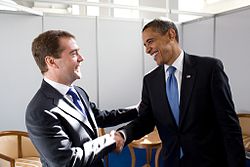


The Obama–Medvedev Commission, officially known as the U.S.–Russia Bilateral Presidential Commission, was announced on July 6, 2009 by President of the United States Barack Obama and President of the Russian Federation Dmitry Medvedev during President Obama's visit to Moscow, as a way to improve communication and cooperation between the governments of Russia and the United States. The two Presidents announced that the work of the Commission would be coordinated by Secretary of State Hillary Clinton and Russian Foreign Minister Sergei Lavrov.[1]
Since 2014, the rapid deterioration of relations between Russia and the United States has seen the activities of the commission been largely curtailed and is essentially defunct.[citation needed]
According to the Mission Statement of the Commission, agreed between the two sides in October 2009, the purpose of the Commission is "identifying areas of cooperation and pursuing joint projects and actions that strengthen strategic stability, international security, economic well-being, and the development of ties between the Russian and American people....the foundation for the work of the commission is based on the core principles of friendship, cooperation, openness, and predictability, and we are resolved to address disagreements openly and honestly in a spirit of mutual respect and acknowledgement of each other's perspective.".[2]
Presidents Obama and Medvedev agreed that the Commission would have thirteen working groups. In October 2009, during the visit to Moscow of Secretary of State Clinton, three additional working groups were added; on Counterterrorism, Environment, and Military to Military. In addition, Sports was added as a sub-group of the Working Group on Education and Cultural Exchanges, and a Policy Steering Group was created, headed by Russian Deputy Foreign Minister Sergei Ryabkov and U.S. Undersecretary of State William J. Burns. The working groups were: